Recently, I had the opportunity to interview Augusto Lim one of the early Filipino pioneer saints. During the interview Augusto shared some of his family’s story including how one set of his great grandparents were Chinese immigrants to the Philippines in the 1800s. Even though they were initially laborers; they worked hard and eventually became merchants importing goods from China to sell to the Chinese living in the Manila area.
Because his grandparents were Chinese, they were discriminated against. Seems like discrimination is a part of every era regardless of where you are in the world. There always seems to be discriminated groups of people for two reasons. One is their nationality and the other, and this appears to be the case with Augusto’s progenitors, because of their social status – being merchants, not professionals, and with little education at the time. For this reason, his great grandparents and parents encouraged (more like insisted) and provided for their children’s education.
Based on this type of discrimination and its lingering effects this had on the family, the main emphasis in the Lim family was to ensure their children became professionals and not business people or merchants but medical doctors, attorney, or teachers. Augusto didn’t disappoint his family and became an attorney in Manila in the late 1950’s building a successful law practice which grew in prestige and notoriety.
As I’ve mentioned before, the Philippines is a Christian nation and is predominately Catholic. The Lim’s were Catholic but rarely attended church services. One Sunday morning one of his daughters was standing on the balcony of their home when a group of her friends all dressed up in their Sunday best were walking by. She called out to them asking where they were going? Their reply, “We’re going to church.”
His daughter turned around and walked into the house asking her father why their family didn’t go to church. He didn’t have a good answer. This put into motion a series of events that included a dream where two young men unknown to him would visit their home in the near future. A few days later two American LDS missionaries arrived at the Lim’s front door. His wife invited these young men into their home but Augusto didn’t want anything to do with these missionaries even though his dream was on his mind….he was just stubborn.
To make a very long story short, eventually Augusto started talking to the missionaries but gave the missionaries a hard time for nearly a year (being a trial attorney) arguing with them about their beliefs. While he agreed with many things they were teaching, he just couldn’t accept the Joseph Smith story or the Book of Mormon, even though they told him it was simply another testament of Christ. Even when they asked him to read the book, he had never taken the time to pick up the book, let alone read the Book of Mormon. It just seemed all too preposterous.
One evening, before going to bed he picked up the Book of Mormon and began to read. He was still reading when the sun came up the next morning. After putting the book down, he knelt in prayer and received a witness that this book was indeed an additional witness of Jesus Christ that it claimed to be. This spiritual experienced changed everything for him. It was something he couldn’t deny because the experience was so deeply profound. He was baptized a short time later.
A week after his baptism he was made the branch financial clerk, a short time after that – the branch clerk, and then branch president. Years later, he would become the first stake president in the Philippines, a mission president, a counselor in the Philippines Area Presidency, a temple president, a patriarch, and the first general authority from the Philippines.
There were many things about his story that was inspiring as we interviewed him but the thing that impressed me the most about this faithful Filipino saint was the financial sacrifices he made in serving the Lord. Augusto had an extremely successful law practice and represented several large real estate companies in Manila and Quezon City when growth in the region was exploding. He shared with me off camera that he had the opportunity to become active in the real estate development arena through his law practice connections but didn’t. He told me if he had pursued these opportunities, he knew that he would have been able to create generational wealth for his family. However, true to what he knew was most important in this life, he took the less obvious path, and elected to put the Lord first in his life. Eventually, he passed on the real estate opportunities presented to him because of the time and commitment it would have taken. He simply couldn’t service his large corporate clients, pursue real estate investment opportunities, and serve the Lord all at the same time. He stayed true to his principles and opted to put the Lord first.
As it turned out, while he was always able to put bread on the table for his family, his church responsibilities took more than half of his time and correspondingly his income took a big hit year after year. Because of his inability to generate fees for his own firm, he eventually had to give up all of his high profile law clients turning these clients over to his partners to handle their legal work because he couldn’t devote the time and attention these clients needed. Instead, he devoted large blocks of his time to his church responsibilities.
As I sat listening to this 89-year-old Filipino pioneer saint share his story and testimony, he told me unequivocally that he had no regrets on how he allocated his time, set his priorities, and that he has the satisfaction of looking back on his life’s priorities knowing they were well set and lived. I gained a lot of respect for Augusto and was inspired as I listened to the sacrifices he made for his faith. Hundreds of thousands of Filipino saints can thank him for the life this pioneer lived.
We Only Dine at Five-Star Restaurants
When we travel in the Philippines, we try and find a trusted place to eat. This often proves to be a challenge. That is why we dine at only the finest establishments when we travel. Here is one of these five-star restaurants we dine at occasionally.
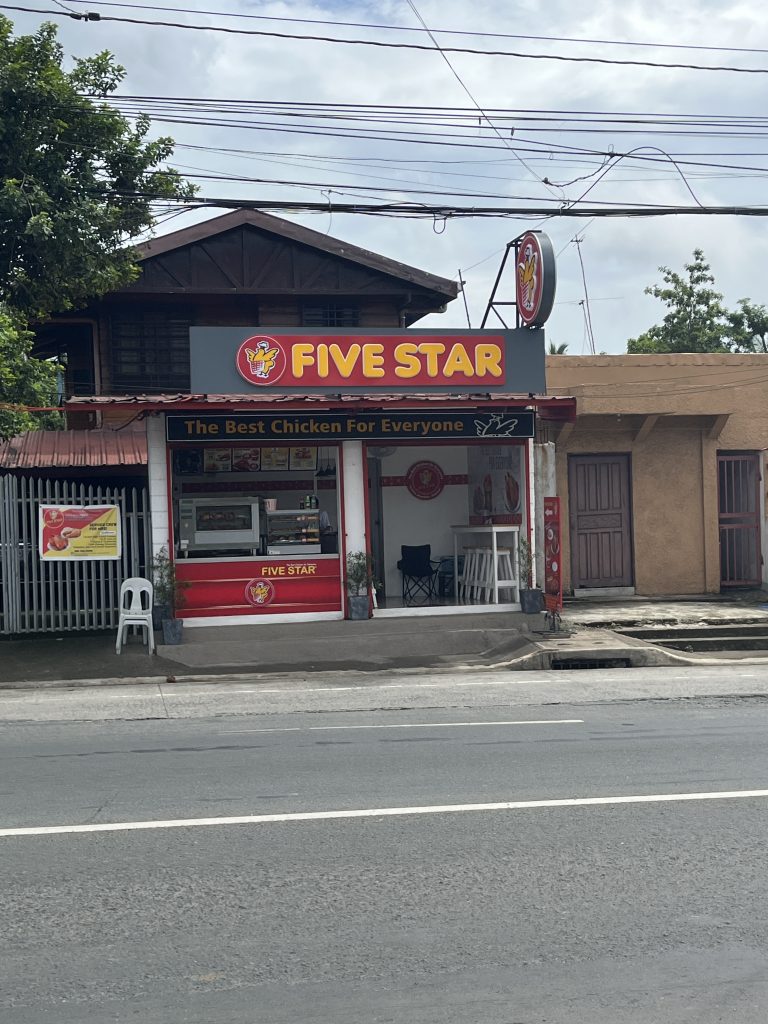
We often shop at local markets. Here is one of the larger ones. Veggies purchased at these types of markets are substantially less than those purchased in stores.
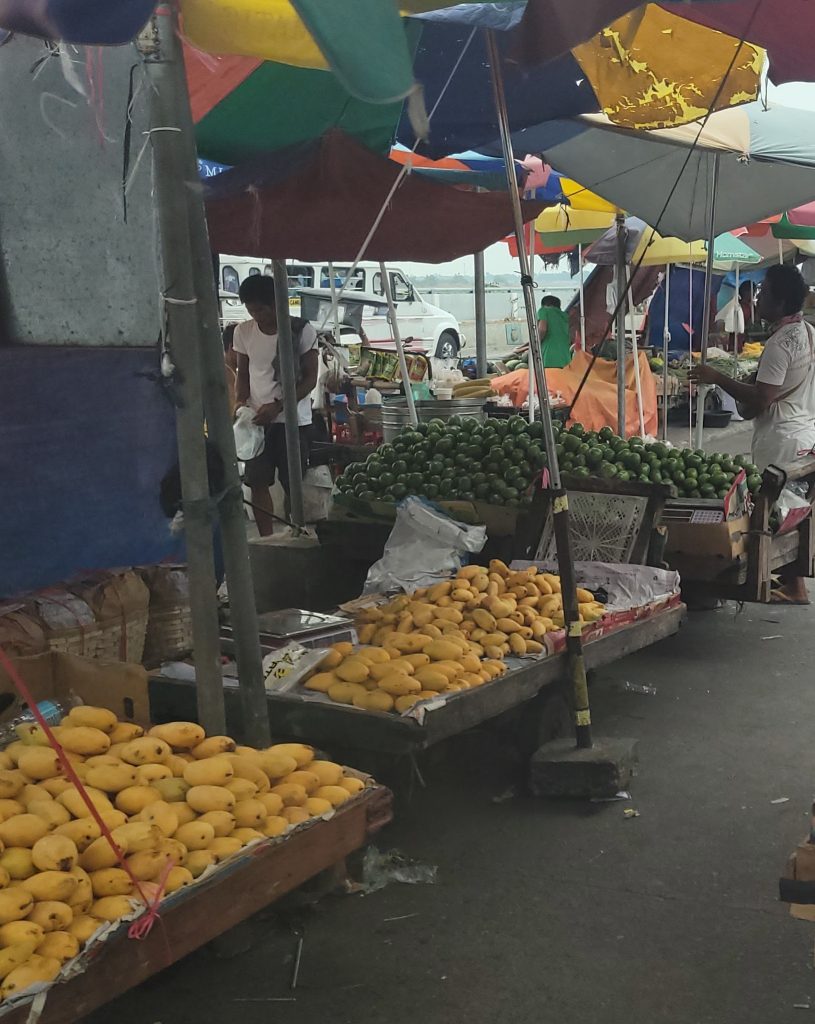
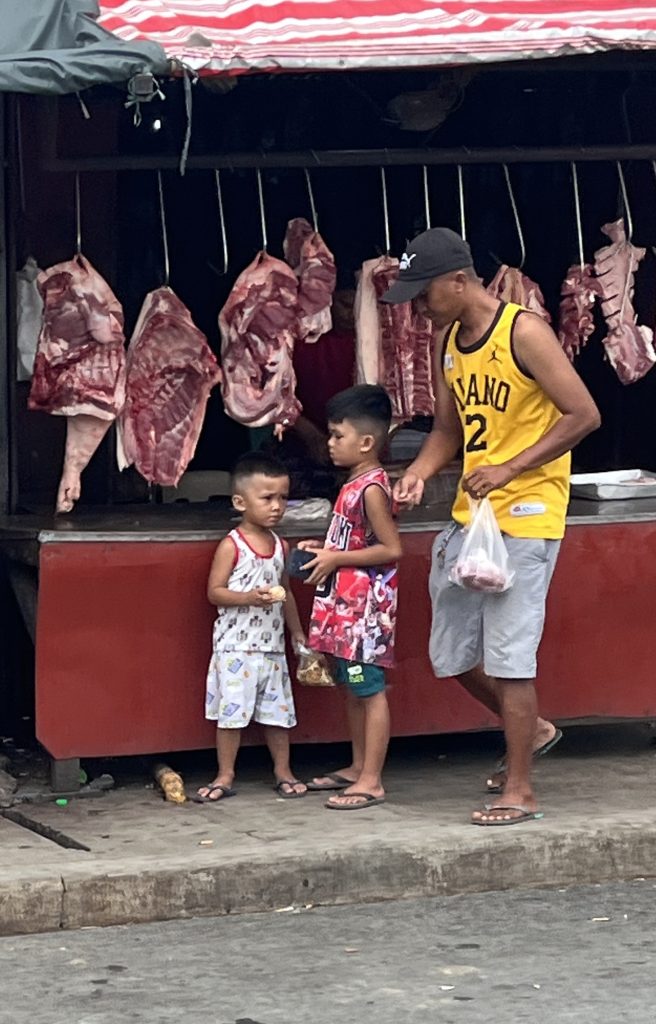
A Typical Butcher Shop in a Barangay in the Philippines
Meats
We don’t shop at outdoor markets like the one above. When we purchase meat and chicken, it’s at a grocery store where the meats are packaged in plastic wrap, dated, and graded.
Drinking water is always an issue here, as it is in many third world countries. We never drink the local water. In the apartment where we live, the water is probably okay, since we are in Eastwood City, which has a relatively stable water infrastructure, but we don’t take any chances and only cook with and drink bottled water. We have a water cooler with a five-gallon water bottle in our apartment and have bottled water delivered for P50 (~$1.00) per bottle every couple of weeks. We use about one of these bottles a week.
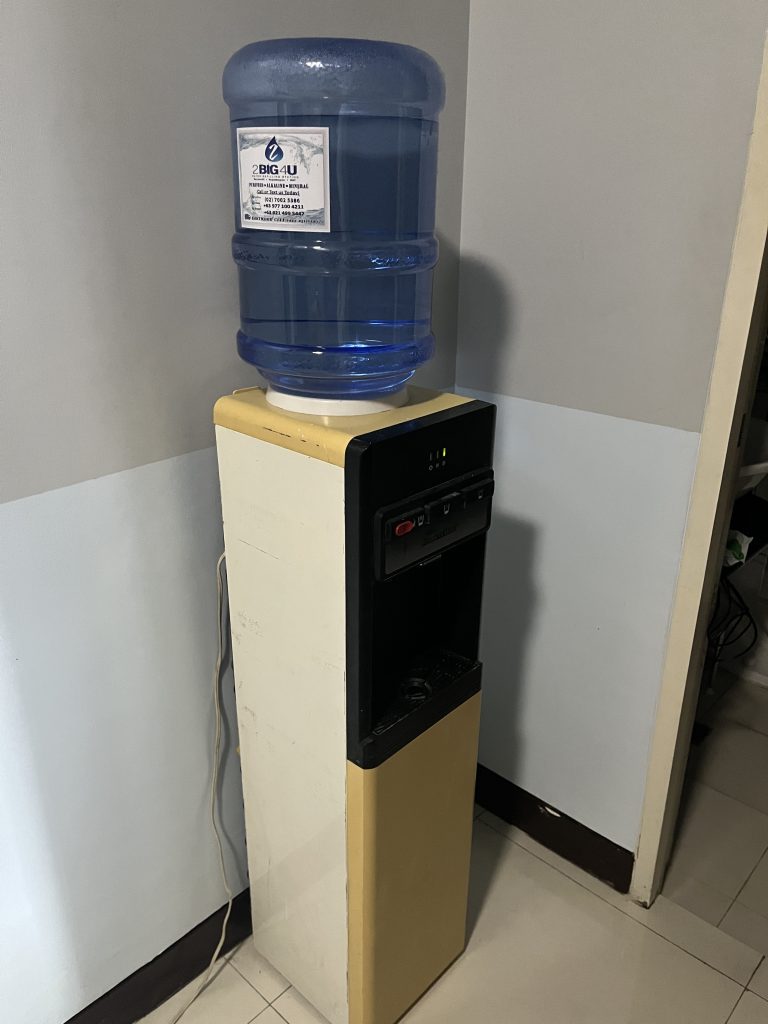
Contrasts
The Philippines is a study in contrast. There are the haves; and the have nots. The picture below is a “have not” area not far from our apartment.
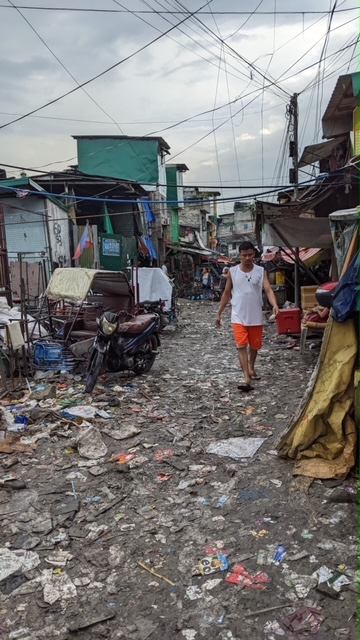
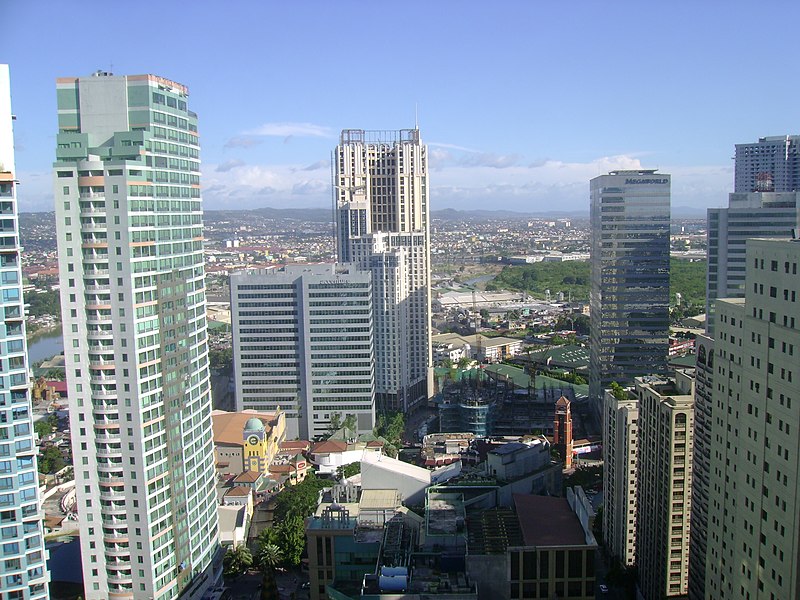
A Picture of Quezon City
There are the “have” areas that are wealthy and similar to other first world counties in many respects. The picture above is of Eastwood City, Quezon, Philippines. This is where we live. Our apartment building is the tallest building of the three progressively taller brownish buildings on the right.
What we continue to learn about life in the Philippines…
A Couple of Non-Judgmental Observations
As mentioned, the Philippines is a Christian nation, the only such nation in Asia. In other countries in the region many of them practice some form of contraception. However, in the Philippines this is far less common driven by multiple factors including religion, uniformed health fears, governmental policies, and the lack of access to contraceptives.
This has resulted in Filipinos currently having 2.2 children per household vs. Thailand that has less than 1 child per household currently. Since the population growth rate is higher than the economic growth rate, this creates an abundant labor supply which in turn suppresses household income. Marcia and I have often commented after walking out of a store (of all sizes) and seeing workers just standing around waiting to help you.
For example, recently I visited the local version of the Home Depot. I needed to pick up rubber seal for our shower door. As we walked into and through the store, we were greeted by someone every fifteen feet asking us if we needed help to find something.
I’ve searched for 5-10 minutes in Home Depot in the US to help to find something. Not so here. I assume that entry level labor is so inexpensive here that businesses are able to employ a lot of people at a nominal cost.
Another case in point. I got my haircut the other day. I had one person wash and rinse my hair massaging my scalp, and shoulders. This person then turned me over to the stylist who cut my hair while another person stood by to brush off hair as it fell from my head on to my shoulders. There was a receptionist who took my payment and as I walked out, there was yet another person sweeping the hair off the floor. For this American, this was a nice small luxury but as I think about, it does seem to be a little bit over the top. Total cost P375 for the haircut ($7.25). If you were to go to a barangay where the locals live, you could get a haircut for a fraction of this….I just don’t have the courage to do this.
Divorce
Every nation in the world allows its citizens to divorce except for the Philippines (though Muslims in the Philippines have the right to divorce) and in the Vatican City, an ecclesiastical sovereign city-state in Italy. These two countries are the only countries which has no procedure for getting a divorce. This has resulted in a non-official divorce in the Philippines of married couples agreeing to divorcing/separating informally by simply moving in and cohabitating with someone else.
In talking to a Grab (a Uber-like car service) driver a few weeks ago, I asked him if he was married? He replied, “Yes, and No.” What he meant was; yes he was legally married, but not legally divorced and not living with his wife. He said it was very expensive to get an annulment so virtually no one does. It is just easier to agree to separate and that’s the end of the marriage. Then you move in and live with someone else.
This does create some issues with worthiness for baptism. The rule here is if someone has co-habited for at least five years continually and is in a committed relationship- which often includes kids, you are considered worthy for being baptized. However, this accommodation does not extend to temple worthiness.
Christmas in the Philippines in September
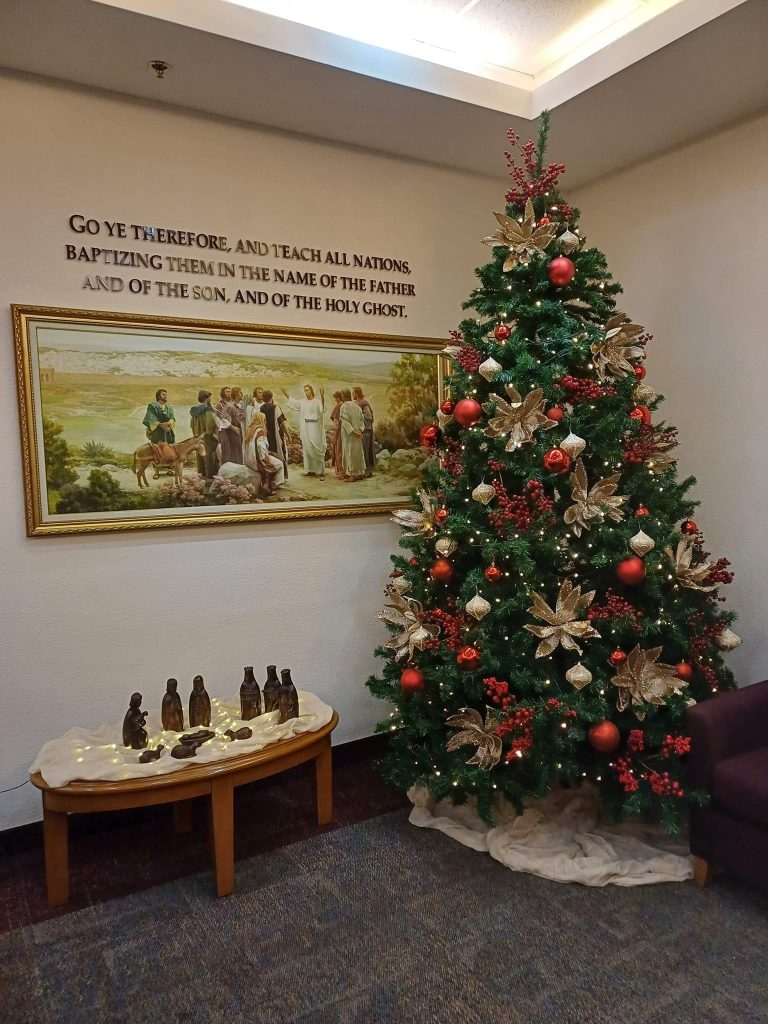
The Christmas season is officially kicked off in September. This is a picture of the Christmas tree in one of the offices in the Philippines Area Office. The other day I was walking through a mall not too far from where we live and there was Christmas music playing over the sound system….and I thought Christmas started early in the US. Christmas is a very big deal in the Philippines.
Thought for the day: Ideas are the most powerful thing on the planet.
Scripture for the week: Doctrine & Covenants 6:36 “Look unto me in every thought; doubt not , fear not.”
